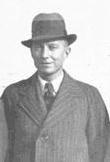Timothy Buck
From Kaiserreich
MaskedPickle (Talk | contribs) m (Tim Buck moved to Timothy Buck) |
MaskedPickle (Talk | contribs) m |
||
| Line 3: | Line 3: | ||
|} | |} | ||
| - | Timothy "Tim" Buck (born on January, 6 1891 in Beccles, England, now in [[Union of Britain]]) is a [[Canada|Canadian]] syndicalist politician. | + | '''Timothy "Tim" Buck''' (born on January, 6 1891 in Beccles, England, now in [[Union of Britain]]) is a [[Canada|Canadian]] syndicalist politician. |
A machinist, Buck was born in England and emigrated to Canada in 1910 reputedly because it was cheaper to book steamship passage to Canada than to [[Australasia|Australia]]. He became involved in the labour movement and radical working class politics in Toronto. In 1921, he participated in the founding convention of the Workers' Party of Canada, inspired by the successes of the [[Russia|Russian]] and French Revolutions. Not initially a leading member of the party, Buck came to prominence as supported by the [[Commune of France]], which expected the increasing turmoil within the British Empire to expand to North America. After the 1925 British Revolution and the subsequent arrival of the Royal Family in Canada, Buck along with other prominent Canadian socialists was arrested under the terms of the War Measures Act and Martial Law: he was condemned to life sentence for treason and sedition, due to his role in the Winnipeg General Strike. | A machinist, Buck was born in England and emigrated to Canada in 1910 reputedly because it was cheaper to book steamship passage to Canada than to [[Australasia|Australia]]. He became involved in the labour movement and radical working class politics in Toronto. In 1921, he participated in the founding convention of the Workers' Party of Canada, inspired by the successes of the [[Russia|Russian]] and French Revolutions. Not initially a leading member of the party, Buck came to prominence as supported by the [[Commune of France]], which expected the increasing turmoil within the British Empire to expand to North America. After the 1925 British Revolution and the subsequent arrival of the Royal Family in Canada, Buck along with other prominent Canadian socialists was arrested under the terms of the War Measures Act and Martial Law: he was condemned to life sentence for treason and sedition, due to his role in the Winnipeg General Strike. | ||
Current revision as of 21:53, 23 February 2009

|
Timothy "Tim" Buck (born on January, 6 1891 in Beccles, England, now in Union of Britain) is a Canadian syndicalist politician.
A machinist, Buck was born in England and emigrated to Canada in 1910 reputedly because it was cheaper to book steamship passage to Canada than to Australia. He became involved in the labour movement and radical working class politics in Toronto. In 1921, he participated in the founding convention of the Workers' Party of Canada, inspired by the successes of the Russian and French Revolutions. Not initially a leading member of the party, Buck came to prominence as supported by the Commune of France, which expected the increasing turmoil within the British Empire to expand to North America. After the 1925 British Revolution and the subsequent arrival of the Royal Family in Canada, Buck along with other prominent Canadian socialists was arrested under the terms of the War Measures Act and Martial Law: he was condemned to life sentence for treason and sedition, due to his role in the Winnipeg General Strike.
Tim Buck is viewed as a martyr according to British Unionist and French propaganda, and symbolically let an empty chair at every reunion of the Syndicalist Internationale to honor Buck in Canada. For Canadian and Exiled British broadcasters, Buck is presented as an archetypal traitor to the Imperial Cause. It's impossible to know if Buck is still alive, and where he is actually detained. Due to censorship and lack of informations, the true leftist influence in Canada is unknown, but seems to be very low, not to say non-existant.
